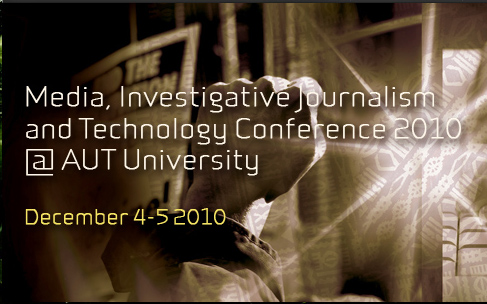
Kim Bowden
He may work in communications – the perceived “dark side” for “journalism refugees” - but Stephen Olsen says the work he and his colleagues do in NGOs is akin to journalism.
In his short address at the Pacific Media Centre's inaugural Media, Investigative Journalism and Technology conference, the strategic advisor to New Zealand-based NGO Community Housing Aotearoa challenged the commonly lauded view that public relations and journalism are worlds apart.
“In today’s environment, in particular, even if you do not feel like that word journalist can be stuck to you, or perhaps you don’t want the label stuck to you, we are all journalists. We are spokespeople,” he said.
“NGOs, that have the budget, can be quite sophisticated in trying to push through messages that aren’t normally getting through other media channels.”
Olsen, who has worked as a journalist and in journalism training, said presently he “earns money in a private sector PR company” as well as working “in NGOs, so it’s a bit of a dichotomy”.
He said his third sector job description is multifaceted.
“I actually find that in my role I have to be an analyst, an advisor, an advocate, and the thing that bundles that all together the best is for me to work as a journalist.”
Inseparable skill
NGO “communications advisors” are “finding they need a skill set that is very close, almost inseparable from a journalism skill set,” he said.
It was a sentiment that echoed an earlier keynote speech made by leading New Zealand investigative journalist Nicky Hager, who argued investigative journalism was being done by those who work in industries “detached from the news media”, just under a different guise, and probably without the byline.
“You can have someone in a human rights organisation that is doing investigative journalism and then handing it to a media outlet,” said Hager.
“It’s just not called investigative journalism.”
Hager challenged what he referred to as news media “vanity” – the assumption only trained journalists can achieve the requisite accuracy, fairness and balance, news media demands - and said suggestions spokespeople outside mainstream media were biased, lacked rigour, or simply had a bee in their bonnet were unfair.
“I know this might sound controversial but I know people in public interest groups who are doing far more rigorous investigative journalism than the journalists who they actually hand-on their work to,” he said.
Ethical frameworks
“That’s where the work is happening.”
Olsen said he had also been broaching the idea of journalism ethical frameworks and how they correlate to “the dark side”.
“If you work in PR or communications you have actually got, believe it or not, some codes and some ethics and in actual fact, after doing some crude analysis, I realise they are not actually that different from the journalism code.”
He said communications workers from NGOs needed to use this as a start point for further developing their own code of ethics.
Kim Bowden is a graduating Diploma in Communication Studies journalist from AUT University.



